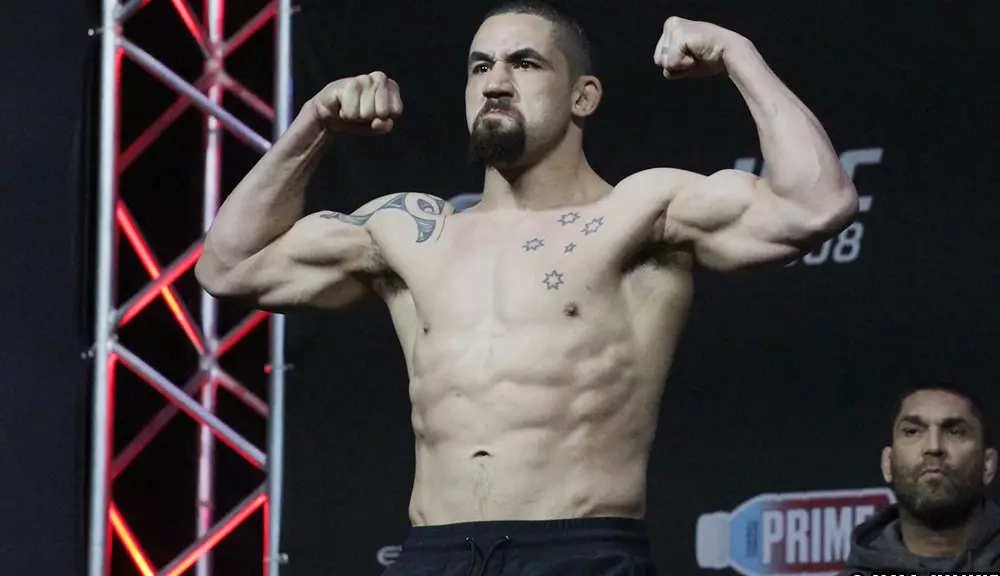The landscape of mixed martial arts (MMA) is ever-evolving, with fighters constantly seeking ways to enhance their career prospects and competitiveness. Former UFC middleweight champion Robert Whittaker stands at a pivotal crossroads in his career, contemplating a significant shift to the light heavyweight division. Such a transition is supported by notable personalities in the fighting community, including former UFC fighter Chael Sonnen, who advocates for Whittaker to explore this move as a strategic career maneuver. This potential transition not only carries implications for Whittaker’s immediate future but also raises questions about the broader dynamics of the weight classes within the UFC.
Robert Whittaker’s career trajectory has been largely defined by his success in the middleweight division, where he captured the championship title and established himself as one of the sport’s elite fighters. However, the competitiveness at 185 pounds has become increasingly palpable, with a host of emerging talents and seasoned contenders creating a congested title picture. As Whittaker considers a move to light heavyweight, it’s vital to understand what drives fighters to shift weight classes. Often, this decision stems from an assessment of their current standing in their existing division and the recognition of potential opportunities in another.
Chael Sonnen, who has had experience competing in both middleweight and light heavyweight, provides an informed perspective on Whittaker’s decision-making process. He argues that transitioning to 205 pounds could allow Whittaker to leverage his speed against a different caliber of opponent, as the attributes that make a fighter successful at one weight may not translate seamlessly to another. For Whittaker, this strategic pivot could reinvigorate his career and provide new challenges that could reignite his championship aspirations.
Sonnen’s analysis includes a critical look at the effects of age—specifically, how a fighter’s speed and quick reflexes may decline as they age while their experience and technical skill should improve concurrently. At 34-years-old, Whittaker is aware of the ticking clock on his fighting career, yet he remains a formidable opponent with a wealth of experience. Sonnen posits that a transition to light heavyweight could serve to “mask” any potential decline in physical speed, allowing Whittaker to retain tactical advantages against larger, arguably slower fighters.
This setup resonates with Whittaker’s recent performance, including a setback against Khamzat Chimaev at UFC 308, which many view as a case of being caught by a strong, emerging talent. The inevitable physical changes that come with age should not overshadow his fight IQ and adaptability—traits that can serve him well in a higher weight class. Moreover, it opens avenues for Whittaker to reinvent his fighting style and approach, giving him the chance to adapt to a new ecosystem within the UFC.
One of the most compelling reasons to support Whittaker’s move to light heavyweight lies in the potential matchups that await him. Sonnen highlights intriguing possibilities, such as bouts against established names like Anthony Smith or Khalil Rountree. These matchups not only provide high-stakes encounters but also establish Whittaker as a drawing card in a new division, addressing the current stagnation at middleweight, where the route to another title shot appears clouded by a plethora of contenders and champions.
Moreover, transitioning to a different weight class can reinvigorate a fighter’s marketability, drawing interest from fans eager to see the outcomes of fresh encounters. Whittaker’s ability to attract attention could soften the competitive landscape at 205 pounds, potentially positioning him as a top contender in a division with fewer hurdles compared to the middleweight scene.
As Robert Whittaker contemplates his next steps, the possibility of moving up to light heavyweight could offer not only a fresh start but also new challenges that may lead to restored glory in the sport. Chael Sonnen’s insights reflect the intricate dynamics of weight classes in UFC, emphasizing that size and reach advantages are often overstated in the grand scheme of fighting. Ultimately, whether Whittaker takes the plunge into 205 pounds could define the next chapter of his career, presenting him with the much-needed opportunity to reclaim his status among the elite in mixed martial arts.

